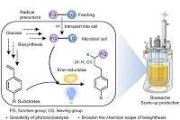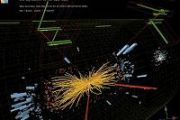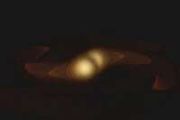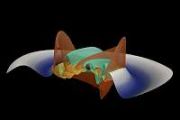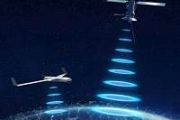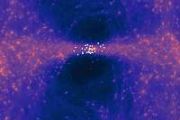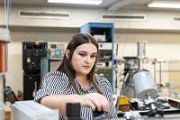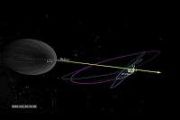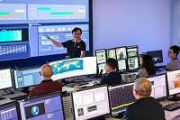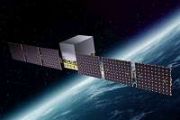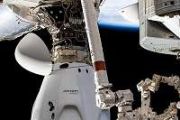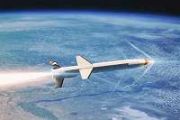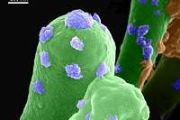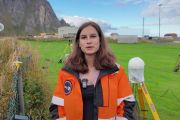
Copernical Team
SpaceX launches Amazon Kuiper satellites in 100th 2025 mission
 SpaceX on Monday launched two dozen Kuiper Internet satellites into orbit Monday on its 100th mission of 2025.
The rocket blasted off from Cape Canaveral Space Force Station in Florida on Monday at 8:35 a.m. EDT, in the 97th Falcon 9 launch of the year. It was the third attempt for this particular mission, as the first two attempts over the weekend were scrubbed due to weather condition
SpaceX on Monday launched two dozen Kuiper Internet satellites into orbit Monday on its 100th mission of 2025.
The rocket blasted off from Cape Canaveral Space Force Station in Florida on Monday at 8:35 a.m. EDT, in the 97th Falcon 9 launch of the year. It was the third attempt for this particular mission, as the first two attempts over the weekend were scrubbed due to weather condition NASA launches second phase of moon recycling competition
 NASA is launching the second phase of its moon recycling competition to clean up trash in space.
The space agency's LunaRecycle Challenge is looking for the brightest minds to figure out a way to recycle plastics, foams and metals left behind by ongoing activity and building in space.
"NASA is eager to see how reimagining these materials can be helpful to potential future planeta
NASA is launching the second phase of its moon recycling competition to clean up trash in space.
The space agency's LunaRecycle Challenge is looking for the brightest minds to figure out a way to recycle plastics, foams and metals left behind by ongoing activity and building in space.
"NASA is eager to see how reimagining these materials can be helpful to potential future planeta Chilean project aims to be at forefront of theoretical astrophysics
 Chile's the CiELO project is opening new frontiers in the study of how galaxies form and evolve, positioning the country as a leader in computational astrophysics in Latin America.
"This is the first simulation project of its kind developed in Chile and in the region," said Patricia Tissera, director of the Center for Astrophysics and Related Technologies and leader of the project.
Chile's the CiELO project is opening new frontiers in the study of how galaxies form and evolve, positioning the country as a leader in computational astrophysics in Latin America.
"This is the first simulation project of its kind developed in Chile and in the region," said Patricia Tissera, director of the Center for Astrophysics and Related Technologies and leader of the project. NASA to unveil last piece of hardware for the Artemis II Orion mission
 NASA is ready to show off its final piece of space flight hardware for the Space Launch System rocket for the Artemis II mission.
NASA has invited media to the Marshall Space Flight Center in Huntsville, Ala., to see the piece.
The rest of the SLS rocket for Artemis II is stacked on mobile launcher 1 at Kennedy. Artemis II, NASA's first mission with crew aboard the Orion spacecra
NASA is ready to show off its final piece of space flight hardware for the Space Launch System rocket for the Artemis II mission.
NASA has invited media to the Marshall Space Flight Center in Huntsville, Ala., to see the piece.
The rest of the SLS rocket for Artemis II is stacked on mobile launcher 1 at Kennedy. Artemis II, NASA's first mission with crew aboard the Orion spacecra Planets without water could still produce certain liquids
 Water is essential for life on Earth. So, the liquid must be a requirement for life on other worlds. For decades, scientists' definition of habitability on other planets has rested on this assumption.
But what makes some planets habitable might have very little to do with water. In fact, an entirely different type of liquid could conceivably support life in worlds where water can barely ex
Water is essential for life on Earth. So, the liquid must be a requirement for life on other worlds. For decades, scientists' definition of habitability on other planets has rested on this assumption.
But what makes some planets habitable might have very little to do with water. In fact, an entirely different type of liquid could conceivably support life in worlds where water can barely ex Meet IDEA: An AI assistant to help geoscientists explore Earth and beyond
 A new artificial intelligence tool developed by researchers at the University of Hawai'i (UH) at Manoa is making it easier for scientists to explore complex geoscience data-from tracking sea levels on Earth to analyzing atmospheric conditions on Mars. Called the Intelligent Data Exploring Assistant (IDEA), the software framework combines the power of large language models, like those used in Cha
A new artificial intelligence tool developed by researchers at the University of Hawai'i (UH) at Manoa is making it easier for scientists to explore complex geoscience data-from tracking sea levels on Earth to analyzing atmospheric conditions on Mars. Called the Intelligent Data Exploring Assistant (IDEA), the software framework combines the power of large language models, like those used in Cha NASA partners with US companies to assess orbit boost for Swift Observatory
 NASA is working with two American firms to study the feasibility of raising the Neil Gehrels Swift Observatory's orbit, potentially extending its mission life and demonstrating new spacecraft servicing capabilities. Cambrian Works of Reston, Virginia, and Katalyst Space Technologies of Flagstaff, Arizona, each received $150,000 Phase III Small Business Innovation Research (SBIR) awards for conce
NASA is working with two American firms to study the feasibility of raising the Neil Gehrels Swift Observatory's orbit, potentially extending its mission life and demonstrating new spacecraft servicing capabilities. Cambrian Works of Reston, Virginia, and Katalyst Space Technologies of Flagstaff, Arizona, each received $150,000 Phase III Small Business Innovation Research (SBIR) awards for conce ULA launches USSF-106 for US Space Force aboard Vulcan rocket
 The U.S. Space Force's Space Systems Command (SSC) and United Launch Alliance (ULA) have completed the first National Security Space Launch (NSSL) mission aboard a Vulcan VC4S rocket. Liftoff occurred Aug. 12 at 5:56 p.m. PDT (8:56 p.m. EDT) from Space Launch Complex 41 at Cape Canaveral Space Force Station, Florida.
Spacecraft separation took place about seven hours later, placing the pay
The U.S. Space Force's Space Systems Command (SSC) and United Launch Alliance (ULA) have completed the first National Security Space Launch (NSSL) mission aboard a Vulcan VC4S rocket. Liftoff occurred Aug. 12 at 5:56 p.m. PDT (8:56 p.m. EDT) from Space Launch Complex 41 at Cape Canaveral Space Force Station, Florida.
Spacecraft separation took place about seven hours later, placing the pay Europe Ariane 6 rocket launches a weather satellite
 Europe's Ariane 6 rocket sent a weather and climate satellite to orbit on Tuesday night.
The Ariane 6 took off at 8:37 p.m. EDT from Europe's Spaceport in Kourou, French Guiana, in its third-ever launch, carrying the Metop-SGA1.
"The mission as a whole not only ensures the continued delivery of global observations from polar orbit for weather forecasting and climate analysis for
Europe's Ariane 6 rocket sent a weather and climate satellite to orbit on Tuesday night.
The Ariane 6 took off at 8:37 p.m. EDT from Europe's Spaceport in Kourou, French Guiana, in its third-ever launch, carrying the Metop-SGA1.
"The mission as a whole not only ensures the continued delivery of global observations from polar orbit for weather forecasting and climate analysis for Trump orders space regulations eased in win for Musk
This request seems a bit unusual, so we need to confirm that you're human. Please press and hold the button until it turns completely green. Thank you for your cooperation!
Press and hold the button
If you believe this is an error, please contact our support team.
185.132.36.159 : 53eab7aa-7e58-44c2-94a9-5faf5c4c




